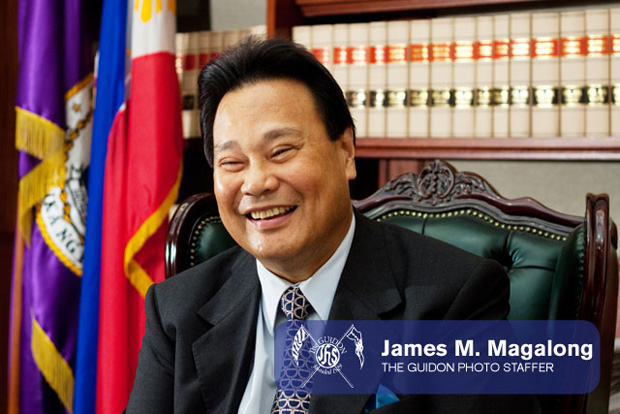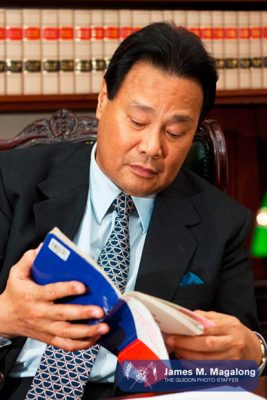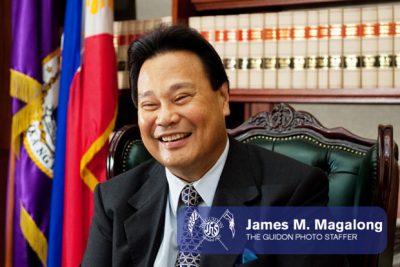“You can’t help but be Atenean,” Chief Justice Renato Corona says, as the self-professed UAAP fan reflects on the impact his Ateneo education has had on his life.
“I’m actually a Jesuit at heart,” he kids, yet the lightness of the moment fails to mask the truth behind those words. The new Chief Justice is as Atenean as Atenean could get.
As if his words weren’t enough to evoke as much fabilioh as his stately office would ever allow, statuettes of St. Ignatius, the Blessed Virgin, and a rather imposing eagle were there to keep him company as well.
He never misses an Ateneo UAAP basketball game, he says, for both the seniors and juniors. He’s a member of the search committee for the next Ateneo president, and he talks about his Ateneo days with incredible gusto. He also still holds on to that old Atenean habit of carrying a rosary in the pocket.
“That’s what we were taught. It will always be that way,” he says.
Media blitz
He tells me how busy his last few days have been. “I have been on interviews almost hour after hour!”
He does give me two reasons, though, as to why he “takes the pains of acceding to the request for interviews.” He mentions the need to address the political tension brought about by his appointment, and the need to recognize the Filipino people’s right to know about their Chief Justice.”
Corona seems rather upset with people who’ve been having a dig at his recent ‘media blitz.’
[These media appearances] are not for self-aggrandizement,” he says. “I just ask that they don’t deny me media exposure now. I think the public has the right to know.”At least for our interview, he shows that he does take this right very seriously. For more than thirty minutes, he fills me in about himself as if he really felt it was his duty-bound obligation to do so.
“God did not put me here in this position with no reason at all,” he explains.
Blue background
Corona graduated with gold medals from both the Ateneo de Manila Grade School (1962) and the High School (1966), and obtained his AB from the College in 1970, also with honors.
He used to be the editor-in-chief of The GUIDON, and served as the secretary-general of the College Editor’s Guild of the Philippines. He was also active in the Debating Society and the Reserve Officers Training Corps, which he says he loved.
Corona also had a part-time job as a speech-writer for former House Speaker Jose B. Laurel Jr. “I became aware of politics and government while having that part-time job,” he says.
Corona’s Ateneo days were pretty exciting times. The First Quarter Storm, a period of leftist unrest in the country before Martial Law, climaxed around Corona’s last year in college.
He was batchmates with martyred revolutionaries Edgar Jopson (then their Sanggu President) and Emman Lacaba (poet turned rebel who co-wrote “Down from the Hill”). Corona got to work with Lacaba in The GUIDON, alongside current Associate Justice Antonio Carpio, also a batchmate.
It was during Corona’s days in the Ateneo that the clamor for Filipinization was greatest and the movement for Social Justice was at its peak. Ateneans then regularly rallied against Marcos and the bishops, to protest against fascism and clerical hypocrisy.
He immediately attended the Ateneo Law School after graduation from Loyola Heights. Even despite the pressures of family life—he married when he was just a freshman at law school—he graduated fifth in his law class and placed 25th out of 1,965 in the Bar Exams.
He would later obtain an MBA from the Ateneo and a Master of Laws from Harvard.
As a young lawyer, he also taught part-time at Loyola. “I was teaching Legal Management,” he says. “I established that program.”
He was eventually invited by Pres. Fidel Ramos to join his cabinet in 1992 as Assistant Executive Secretary. From that position, Corona slowly moved his way up, until he was appointed Associate Justice by President Gloria Arroyo back in 2002.
Half of the story
“Just because a person’s your boss doesn’t mean you’re close,” he says, when asked about his relationship with Arroyo. “If I were close to her, then I shouldn’t have left Malacañang.”
Corona was previously appointed as Presidential Chief of Staff and Presidential Spokesman.
Corona says he told Arroyo that he didn’t want these jobs. According to him, “[those jobs in the Palace] get political, whether you like it or not.”
Corona also got upset with suggestions that he was too pro-Gloria.
“That’s absolutely false! They say that because, according to them, there were 18 cases where I voted in favor of the government,” he explains, “but that is half of the story!”
“I’ve written over 900 ponencia,” he says, clearly ticked off. “They chose 18 where I voted in favor of the government; there are more cases where I voted against the government!”
“Now, are those accusations fair?” he asks.
High hopes
Asked about Noynoy Aquino, Corona says he has high hopes for him. “We should pray for him, for his success,” he says.
But Corona doesn’t seem to mind about getting snubbed for Aquino’s oath-taking.
“That’s fine with me.” he says. “That’s just his opinion. As someone said, ‘I may not agree with what you say, but I will fight to the death for your right to say it.’”
Corona had some last words at the conclusion of the interview. “I’m addressing myself to two sets of people,” he says.
“To critics, watch me, but do not judge me yet. It is too early to judge. Watch what I will do, and maybe you will change your minds.”
“And to those who’ve kept faith, you won’t be disappointed.”










[…] ex-chief justice also taught at the law school and at the Loyola Schools. In a previous interview with The GUIDON, he said he established the legal management program at the Loyola Schools. var […]